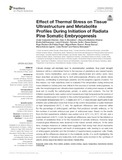Mostrar el registro sencillo del ítem
Effect of thermal stress on tissue ultrastructure and metabolite profiles during initiation of Radiata pine somatic embryogenesis
| dc.creator | Castander Olarieta, Ander | es_ES |
| dc.creator | Montalbán, Itziar A. | es_ES |
| dc.creator | Oliveira, Eliana de Medeiros | es_ES |
| dc.creator | Dell'Aversana, Emilia | es_ES |
| dc.creator | D'Amelia, Luisa | es_ES |
| dc.creator | Carillo, Petronia | es_ES |
| dc.creator | Steiner, Neusa | es_ES |
| dc.creator | Fraga, Hugo Pacheco de Freitas | es_ES |
| dc.creator | Guerra, Miguel Pedro | es_ES |
| dc.creator | Goicoa Mangado, Tomás | es_ES |
| dc.creator | Ugarte Martínez, María Dolores | es_ES |
| dc.date.accessioned | 2019-07-01T09:27:44Z | |
| dc.date.available | 2019-07-01T09:27:44Z | |
| dc.date.issued | 2019 | |
| dc.identifier.issn | 1664-462X | |
| dc.identifier.uri | https://hdl.handle.net/2454/33542 | |
| dc.description.abstract | Climate change will inevitably lead to environmental variations, thus plant drought tolerance will be a determinant factor in the success of plantations and natural forestry recovery. Some metabolites, such as soluble carbohydrates and amino acids, have been described as being the key to both embryogenesis efficiency and abiotic stress response, contributing to phenotypic plasticity and the adaptive capacity of plants. For this reason, our main objectives were to evaluate if the temperature during embryonal mass initiation in radiata pine was critical to the success of somatic embryogenesis, to alter the morphological and ultrastructural organization of embryonal masses at cellular level and to modify the carbohydrate, protein, or amino acid contents. The first SE initiation experiments were carried out at moderate and high temperatures for periods of different durations prior to transfer to the control temperature of 23 degrees C. Cultures initiated at moderate temperatures (30 degrees C, 4 weeks and 40 degrees C, 4 days) showed significantly lower initiation and proliferation rates than those at the control temperature or pulse treatment at high temperatures (50 degrees C, 5 min). No significant differences were observed either for the percentage of embryogenic cell lines that produced somatic embryos, or for the number of somatic embryos per gram of embryonal mass. Based on the results from the first experiments, initiation was carried out at 40 degrees C 4 h; 50 degrees C, 30 min; and a pulse treatment of 60 degrees C, 5 min. No significant differences were found for the initiation or number of established lines or for the maturation of somatic embryos. However, large morphological differences were observed in the mature somatic embryos. At the same time, changes observed at cellular level suggested that strong heat shock treatments may trigger the programmed cell death of embryogenic cells, leading to an early loss of embryogenic potential, and the formation of supernumerary suspensor cells. Finally, among all the differences observed in the metabolic profile, it is worth highlighting the accumulation of tyrosine and isoleucine, both amino acids involved in the synthesis of abiotic stress response-related secondary metabolites. | en |
| dc.description.sponsorship | This research was funded by MINECO (Spanish Government) project (AGL2016-76143-C4-3R), CYTED (P117RT0522), and DECO (Basque Government, "Ayudas de formacion a jovenes investigadores y tecnologos"). | en |
| dc.format.extent | 16 p. | |
| dc.format.mimetype | application/pdf | en |
| dc.language.iso | eng | en |
| dc.publisher | Frontiers Media | en |
| dc.relation.ispartof | Frontiers in Plant Science, January 2019, volume 9, article 2004 | en |
| dc.rights | © 2019 Castander-Olarieta, Montalbán, De Medeiros Oliveira, Dell’Aversana, D’Amelia, Carillo, Steiner, Fraga, Guerra, Goicoa, Ugarte, Pereira and Moncaleán. This is an open-access article distributed under the terms of the Creative Commons Attribution License (CC BY). The use, distribution or reproduction in other forums is permitted, provided the original author(s) and the copyright owner(s) are credited and that the original publication in this journal is cited, in accordance with accepted academic practice. No use, distribution or reproduction is permitted which does not comply with these terms. | en |
| dc.rights.uri | http://creativecommons.org/licenses/by/4.0/ | |
| dc.subject | Amino acids | en |
| dc.subject | Pinus radiata | en |
| dc.subject | Proteins | en |
| dc.subject | Somatic embryo | en |
| dc.subject | Sugars | en |
| dc.subject | Temperature | en |
| dc.subject | Transmission electron microscopy | en |
| dc.title | Effect of thermal stress on tissue ultrastructure and metabolite profiles during initiation of Radiata pine somatic embryogenesis | en |
| dc.type | info:eu-repo/semantics/article | en |
| dc.type | Artículo / Artikulua | es |
| dc.contributor.department | Estadística, Informática y Matemáticas | es_ES |
| dc.contributor.department | Estatistika, Informatika eta Matematika | eu |
| dc.rights.accessRights | info:eu-repo/semantics/openAccess | en |
| dc.rights.accessRights | Acceso abierto / Sarbide irekia | es |
| dc.identifier.doi | 10.3389/fpls.2018.02004 | |
| dc.relation.projectID | info:eu-repo/grantAgreement/MINECO/Plan Estatal de Investigación Científica y Técnica y de Innovación 2013-2016/AGL2016-76143-C4-3R | en |
| dc.relation.publisherversion | https://doi.org/10.3389/fpls.2018.02004 | |
| dc.type.version | info:eu-repo/semantics/publishedVersion | en |
| dc.type.version | Versión publicada / Argitaratu den bertsioa | es |
Ficheros en el ítem
Este ítem aparece en la(s) siguiente(s) colección(ones)
La licencia del ítem se describe como © 2019 Castander-Olarieta, Montalbán, De Medeiros Oliveira, Dell’Aversana, D’Amelia, Carillo, Steiner, Fraga, Guerra, Goicoa, Ugarte, Pereira and Moncaleán. This is an open-access article distributed under the terms of the Creative Commons Attribution License (CC BY). The use, distribution or reproduction in other forums is permitted, provided the original author(s) and the copyright owner(s) are credited and that the original publication in this journal is cited, in accordance with accepted academic practice. No use, distribution or reproduction is permitted which does not comply with these terms.




